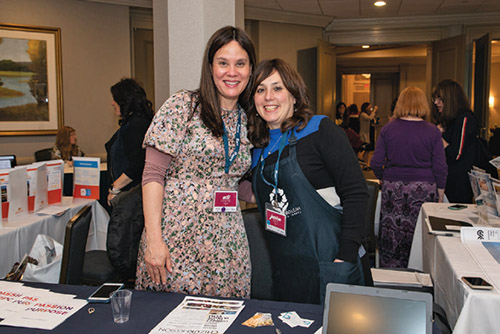

Last week, 100 women of varied ages, 56 communities or geographic locales and representing the spectrum of hashkafot (backgrounds) within Orthodox Judaism engaged in networking, formal and informal discussions, and workshops on volunteer recruitment, public speaking, forming nonprofit boards, team building, dealing with donors, and initiating difficult conversations. The activities were organized with an eye to helping these women build lay leadership skills to use in their own communities.
The inaugural Orthodox Union Women’s Initiative Leadership Summit was held on May 20 and 21 at New Jersey’s Woodcliff Lake Hilton. The summit was the latest endeavor of the Women’s Initiative, which launched 18 months ago to provide a varying degree of Jewish women’s services, including online Torah classes, a speakers bureau featuring outstanding female Torah scholars, and grants for innovative synagogue women’s programs. The leadership summit, however, was perhaps the initiative’s most challenging project so far, as there was no roadmap and no current cadre of known leaders in every community.
Rebbetzin Adina Shmidman, Ph.D., founding director of the OU Women’s Initiative, shared that she was pleased to meet and network with the women at the summit. She described it as “a powerful moment of gathering and growth with a diverse group of talented and bright women across the Orthodox community. I am inspired and energized to move forward with a strong network and charge to contribute,” she told The Jewish Link.
Acknowledging that many of the women are trying to come up with ideas and initiatives on their own, Chamie Haber of Norfolk, Va., said “The energy that there are this many women who are giving of their time to [God] is inspiring,” and shows every person should spend time on a cause they care about, she said.
Jessica Katz, founder of Yad Leah, an organization based in Passaic that sends gently used clothing to Israel, said she found it “beneficial to meet with other women who are driving and leading other organizations, to be able to share resources about organization policy, development and infrastructure, so we can interact, pool ideas and learn from one another.
“Sometimes we meet with others in the nonprofit world [to develop ideas and strategize], but meeting specifically with women, with Jewish women who share the same values, is particularly beneficial,” she said.
One of the keynote speakers was Erica Brown, director of the Mayberg Center for Jewish Education and Leadership at George Washington University where she is also a professor in the Graduate School of Education. She taught several workshops, including one that focused on reframing how women approach difficult conversations—something that is crucial in leadership roles.
Using examples from Tanach, Brown also highlighted what it means to be “called to lead” and provided examples of how leaders should behave. She said that even Moses faced challenges to his leadership and questioned his own ability when God first approached him.
Brown also advised the leaders that it is OK to say no. “When you say yes to too many things you can’t say yes to the things that Hakadosh Baruch Hu [God] wants you to say yes to,” she said, adding, “every yes is also a no.”
Brown told The Jewish Link that she was impressed by the group. “The OU Summit brought together a powerful group of women to learn and network with each other. The challenge is always how to carry the energy, introspection and new skills into actual leading when a conference is over. I believe that this group of women will make that happen,” she said.
Allen Fagin, executive vice president of the Orthodox Union, said the marker for success of the event would be “not just what the women will pick up during the summit, but what they will take back to their communities, and that will have an enormous impact on any number of institutions that are critical to our community. That is precisely the impact we hoped the Women’s Initiative would be able to foster.”
Within moments after the summit ended, participants were already turning to each other via social media to continue the dialogues, suggesting programs and ideas that might help others.
For Ashira Krakowski, who lives in Jerusalem and runs a surfing program for girls at a women’s-only beach in Israel, the summit was well worth the trip. “I feel that in order for me to empower other women, I needed to feel empowered,” she said. “I got more strategies for making sure I am moving in the right direction, and I am making good connections. Even if I came just for Erica Brown’s speech, I got what I needed.”
*Author’s Note: Faygie Holt was a paying participant of the O.U. Women’s Initiative Leadership Summit and attended the conference on behalf of her local synagogue.
By Faygie Holt
�










